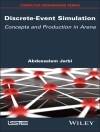This book reviews recent advances in theory and applications of genetic algorithm (GA). The book is composed of five parts; Part 1 of the book involves the chapters about the advances in GA theory. Part 2 concerns applications in health, society, and economy. Part 3 has an inclusive focus on application in power systems, and Part 4 concerns the applications of GA in electrical vehicle industries. Finally, Part 5 includes applications in signal and image processing.
表中的内容
Evolutionary Computation: Perspectives on Past and Future.- Genetic Algorithms: A Technical Implementation of Natural Evolution.- Mating In Genetic Algorithm With Application In System Identification.- A Hybrid Biased Random-Key Genetic Algorithm for the Container Relocation Problem.- Genetic Algorithm and Its Applications in Power Systems.
关于作者
Mahdi Khosravy was born in Birjand city, Iran, 1979. He received BSc. in Electrical Engineering (bio-electric) from Sahand University of Technology, Tabriz, Iran, and MSc. in Biomedical Engineering (bio-electric) from Beheshti University of Medical Studies, Tehran, Iran. Mahdi received his Ph.D. in the field of Information Technology from University of the Ryukyus, Okinawa, Japan. He was awarded by the head of University for his excellence in research activities. To grow his international experience in education and research, in September 2010, he joined University of Information Science and Technology (UIST), Ohrid, Macedonia, in the capacity of assistant professor. In 2016, he established a journal in information technology (ejist.uist.edu.mk) in UIST as currently hold its executive editorship. UIST professorship helped him a lot to extend his international collaborations. In July 2017, he became an associate professor. August 2018 he joined the Energy lab in University of the Ryukyus, Japan as a Visiting Researcher, and from April 2018 to September 2019, he was jointly a visiting associate professor in Electrical Engineering Department, Federal Universit of Juiz de For a in Brazil. From October 2019 to 2021 he was Specially Appointed Researcher in Osaka University. Since 2021, he is a senior research scientist in Cross Labs, Cross Compass Ltd., Tokyo, Japan. Dr. Khosravy is a member of IEEE.
Neeraj Gupta is Sr. Scientist at Kevadia Inc. Michigan, USA in the department of Kevadia Intelligence. where he is playing an instrumental role and lead in design and development of automated Deep learning platform to build edge enabled AI automatically for given data, without involving any expert (end-to-end digital expert). Prior to his industrial joining he served Oakland University, Rochester, Michigan in the Department of Computer Science and Engineering from 2017 to 2022, as Assistant professor, and Teaching & research staff. In addition to his academic service, Dr. Gupta was an Assistant. Professor at University for Information Science and Technology, “St. Paul the Apostle ”, Ohrid, Macedonia from 2014 to 2017. He received his Ph.D. from Indian Institute of Technology Kanpur, India in 2013 and geared up his carrier in Indian Institute of Technology Jodhpur, India as Postdoctoral Fellow and Guest Faculty until 2014. His research interests include Edge Enabled Deep Learning, Deep Learning, Computational Intelligence, Visual Computing, Evolutionary Computing, and Big Data Analytics.
Olaf Witkowski is a leading expert in AI and Artificial Life. He is the Founding Director of Cross Labs, a research institute in Japan, focusing on the study of intelligence in biological and synthetic systems. He is the President of the Board of Directors of the International Society for Artificial Life, Executive Officer at leading AI company Cross Compass, and External Lecturer at the University of Tokyo. He has cofounded multiple ventures in science and technology on three continents, including YHouse Inc. (nonprofit institute on the emergence of consciousness) and the Center for the Study of Apparent Selves (focusing on the ethics of agents). His research focuses on empathic, open-ended, collective, and hybrid AI built from a mathematical understanding of intelligence in any substrate.












